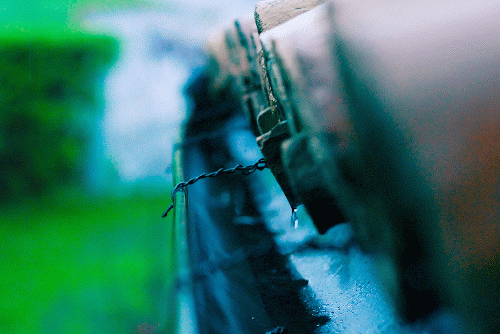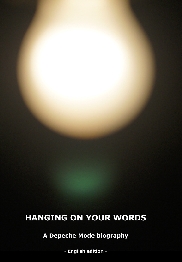1996
In spring 1996 the band, now reduced to three members, met in New York for
a recording-session for Ultra. They spent six weeks there, during which in
the end only one song was completed. Dave was taking heroin and cocaine at the
same time, because taking only one of them didn't work anymore.
Martin: "But he was hiding his habit from us again - lying to us,
saying 'now I'm clean'. We got one usable vocal out of him in four weeks and
we told him, 'Go home to L.A. and sort yourself out. We'll record you later
in the year.' Dave seemed quite happy to go along with it. Of course, I
felt sympathy but I also thought, how seriously is he taking this? We're
slogging away and he's so ... ill that he's never going to be fit to carry on."[1]
A thought which might have come to him before they started to record the album ...
And it's strange that he said that Dave had been able to hide his habit from them.
There's an unaired radio-interview from December 1995 in which Dave was
definitely high, unable to speak in complete sentences, giving the impression
of being confused, and not sure about what he was doing or saying (probably the
reason why this interview wasn't aired). It's difficult to imagine that Martin
didn't notice that - or this:
Dave: "When we started this album, 90 per cent of the time I was still
strung out, and the rest of the time I was sick from kicking. It became very
obvious that physically I wasn't able to stand up in front of a microphone
for more than an hour without wanting to lay down and die.[2] The only vocal
on the album that I recorded at Electric Lady - the only vocal I performed
high - was Sister of Night. I can hear how scared I was. I'm glad it's
there to remind me. I could see the pain I was causing everybody."[3]
Nevertheless, he liked that song very much and felt appealed by the lyrics.
"The song is, for me, it kinda takes me through what was wonderful about being
in love, everything about it, and then, by your own actions, how you can
destroy it."[4]
Fletch: "It's all been done in London, basically. Started September
'95, then we had a six-week period in New York last spring, then Tim went to
LA after that ... after Dave's ...thingy ... to record Dave's vocals for
three or four weeks, then we came back home and finished here."
Martin (laughs): "That's the best I've heard it described! Dave's thingy!"[5]

(Giving voice to the flame (Sister of Night) - with friendly permission of © Laura Bâlc)
The "thingy" meant that Dave was arrested after an overdose because of cocaine
possession and because of being under the influence of heroin.
"Police and paramedics were called to the Sunset Marquis hotel in Hollywood,
popular with musicians, and found Gahan, aged 34, unconscious on the floor of
a hotel room", The Guardian reported, "the people
with him, who summoned help, said he passed out 10 minutes after injecting a
'speedball' - a mixture of cocaine and heroin. He was taken to Cedars-Sinai
Medical Center and treated for an overdose, then taken to the police station
and booked."[6]
He spent two nights in prison before he was dismissed on bail. Later he would
recall that time as very scary because he was in a cell with some other men,
some of them accused of murder.
Dave: "I came out of jail and I got straight back into it. I remember
I was sitting on the couch and I'd shot up dope again, and it wasn't working.
I just couldn't do this to people any more. I didn't want my son to grow up
and wonder why his dad died or killed himself. So I picked up the phone. For
the first time the couple of years that I'd been in and out of detox, I picked
up the phone and said, 'I need help, I wanna get clean. What do I do?'"[7]
If he kept off drugs, the charges against him would be dropped. He had to go to
a urine test twice a week within the next two years. If one test was positive,
two years in prison would await him.
Dave: "All I can do is hope my actions will speak much louder than the
crap that's come out of my mouth the last few years. I don't have anywhere to
go. I lost my house, even lost the visitation rights to my son. But all that
will come back if I stay clean. Every day is better. When I left the hospital,
I said to someone that I'd overdosed, and they said, 'David, you died. They
revived you three times.' I could have had permanent brain damage. People
seem to believe the myth that if you just do it once you're fine, and now
many people seem to be going straight to heroin, bypassing pot and all that
and going straight to the devil. It's really scary. I saw this happening in
London - lots of kids smoking a joint in the loo are smoking heroin in it and
are chasing the dragon. They think that because they're not mainlining it won't
get them. I don't want to be any kind of preacher. I'm in a rock'n'roll band,
and I love to do that and just want to be David. I'm happy to get in touch with
that little kid that was lost inside."[8]

(The Bottom Line (rainy day) - with friendly permission of © Paolo Gobbo
So he finally underwent a serious detox, and went into therapy.
The band's statement was quite simple at first:
"As you may know, Dave accidentally overdosed on drugs in Los Angeles on May
28th. Upon release from the hospital he was arrested for possession of a
controlled substance and being under the influence. Following his release on
bail, Dave moved into a live-in rehabilitation centre for four weeks. He has
since entered a 'sober living house' which gives him more flexibility to work
on upcoming projects."[9]
Again, as previously in Alan's case, when they issued a brief statement that he
had left, but the band would continue, one had the feeling they shouldn't have
said anything else. Later interviews didn't help to get rid of that feeling,
especially because they showed up many of the conflicts within the band.
Question: "Does it seem sometimes funny to you when
Dave interprets your lyrics?"
Martin: "No, because Dave is like another instrument. He's the voice of
the band. His voice is particularly suited to a lot of the songs. I can't
sing the way he sings."[10]
This is one of the statements Dave was irritated about. It seems he doesn't
like being seen as an instrument, although it is a typical view among musicians.
Question: "Does it influence your relations that Dave is in
L.A. and the rest in London?"
Martin: "I think the fact that there is such a great distance between us
sometimes raises more communication problems. We are realising that we should
keep in touch more often."[11]
Fletch: "There's no difference really because even when Dave was living
in England we hardly saw him at all, and the same with Alan, we never saw him
and he only lived 20 minutes away."[12]
Dave: "I don't really have much of a relationship with the others
outside of the band. When you're on the road for that long, and that was
nearly two years, I think the last thing you want to do is hang out
together." (laughs)[13]
Question: "Do you find it difficult to be in the studio again?"
(Attention: Joke of the year is following!)
Martin: "This record has been really easy for us to make."[14]
Fletch: "We had to satisfy ourselves that Dave wanted to do it. I think
there's a strong bond between us all. I think Alan thought that when he left
the band it was going to be enough to split us up but I think the bond is much
stronger than he believed."[15]
Dave: "Yes, but we have done our best work in the last few months. It
gets more and more difficult because when you know each other so well, little
things become really big things. There is a lot of outside things ... everyone's
got families and they've got other interests outside of the band so less and
less time really gets spent on making music together. The roles are very
defined: Martin writes the songs and I sing them. We have Tim Simenon working
with us on this record and a number of other people playing music, programming
and stuff like that. Tim is playing a really big role in it. I wouldn't say
that he replaced Alan because it's completely different thing, but he fulfils
that role. I think Martin is working a little bit harder in pushing himself
further and working in the studio because there's nobody else to do it.[16]
In retrospect, I wasn't ready and it was more important for me to take heroin
than being in the band, but I think that in the last few months I feel like
I've done some of my best work. I've thrown myself into it, I've been working
with a vocal coach, Evelyn. It's a long process and I'm trying to put all my
energy into doing that ..."
Question: "Do you find it easy to sing the new songs?"
Dave: "I never find it easy to sing. It is a very emotional thing to
do. Everything else is pretty much programmed and it's all what I call 'head-work'.
When I sing I sing from my heart and it's the human element in Depeche Mode."[17]
Question: "Are you more involved in the production now?"
Martin: "In the past, Alan was almost a control freak. I think he'd
even admit he's a bit of a control freak. He tended to really focus on the
production and it's something that didn't interest me as much. Obviously, I
cared about what was going on and what the end result was. If I liked what he
was doing then I would let him get on with it. If it came to a point where I
really didn't like something, then I would say I don't think that works."[18]
Here he named exactly what Alan criticized, and Dave would do later as well, without
seeing that Alan was not the only one being "guilty" of the conflict. If you stay
back most of the time and only say what you DON'T like it'll probably irritate
the other one. But it seemed as if Martin was suffering from a "blind spot" here.
Martin: "We have never worked with a programmer before, we've always
done it ourselves." (He meant: Alan did it.) "We've never had outside musicians
constantly in the studio with us before." (He meant: They didn't need any because Alan
was able to play almost every instrument.) "Dave Clayton, the musician we are working
with now, in a way fulfils Alan's role, but it's far easier to manipulate him.
If Alan didn't like something, I am sure he wouldn't actually play it badly, but
if we say to Dave, 'Can you try this out for us?' he'll try it, and he'll try his
hardest to make it work for us."[19]
Question: "Has Alan's departure changed the roles and
responsibilities within the band?"
Fletch: "I think that Alan was trying to gain control of everything
towards the end of the project, and because I wasn't very well, he was doing
that. He was able to take control, and I think I deal with things a bit differently.
I don't think the roles have changed at all ... we just replaced Alan with a
team of people."[20]
It's amazing how many people they needed to replace one single man.
Martin: "It was important for us to fill his shoes. I think that Tim and
his team helped to fulfil that role. The musicians in Tim's team were very
important. Because Alan was always the so-called musician in Depeche Mode.
The classical trained one. It's a fine line. What's a musician? I can play a
guitar and I can play keyboards, but I was never classically trained."
Fletch: "He can read music-scores as well."
Martin: "I never had any music theory, I just know what sounds good
and what moves me when I write it, when I try out things. So this was a totally
different way of working for us."[21]
Some fans tend to label Alan as a victim. But - as we've already seen - there are
two sides to every story. Therefore it's too simple to see him as the unfortunate
victim, (or "fluffy bunny-wunny" to say it with his words.)
Some fans tend to see him as a traitor, as the one who committed the crime of
leaving "the sinking ship", as the one who left his friends in the lurch. I think
this view is unfair, because you have realise the amount of work he put into
this band.
Where would DM have got without him? Would they have been able to produce albums
like Violator? Would they have been able to play in front of 70,000 people
at the Rosebowl? I wouldn't be so sure.
But it would also be wrong to say that the entire success was due to him, (like
some other fans do.) It was the success of this special team. Alan alone wouldn't
have gotten far without Martin's songs and Dave's distinctive voice and charismatic
live performance.
Fans tend to stress the role of the co-producers too much. In message-boards you
often read sentences like "if they worked with Flood again, the album would be
great." But a producer is never the driving musical force of a production. Talking
to Gareth Jones and Steve Lyon both said that as producers they always try to do
what the band / artist wants. They might bring in ideas and some kind of style,
but the basics of an album are always up to the band themselves.
"This is what they wanted and this is what they got," Steve Lyon replied
on the question whether it was wanted or accidentally that the album Host,
which he produced, by the band Paradise Lost (a metal band in their basics) turned
out their so-called "Depeche Mode album". "It was a very different kind of record
for them. If you had listened to the demos to this album, the final result wasn't
so different. So, that's the album they wanted to make. A band always knows what
they want. A producer is the person in the middle to bring in an external voice."[22]
Although Martin and Fletch were to stop bitching about Alan after a while, the band
nevertheless tends to deal rather unfairly with Alan's role.
References:
[1] They Just Couldn't get Enough, Q, March 1997. Words: Phil Sutcliffe
[2} Depeche vs Drugs, Winnipeg Free Press, 1 May 1997. Words: Mark Brown
[3] Tears of my Tracks, Q, March 1997. Words: Phil Sutcliffe
[4] K-ROQ FM, L.A., February 1997, DJs: Kevin and Bean
[5] Dead Man Talking, NME, 18 January 1997. Words: Keith Cameron
[6] Pop Singer Arrested, The Guardian, 29 May 1996. Words: Uncredited
[7] Dead Man Talking, NME, 18 January 1997. Words: Keith Cameron
[8] I'm Hanging on by my Teeth, Melody Maker, 27 July 1996. Words: Steve Hochman
[9] Introduction, Bong 29, August 1996. Words: Uncredited
[10] Rolling Stone, 1993, Words: Marvin Scott Jarrett
[11] Catching up with ... Martin, Bong 30, December 1996
[12] Catching up with ... Fletch, Bong 30, December 1996
[13] Catching up with ... Dave, Bong 30, December 1996
[14] Mode Three, Future Music, April 1997. Words: Uncredited
[15] Catching up with ... Fletch, Bong 30, December 1996
[16] Mode Three, Future Music, April 1997. Words: Uncredited
[17] Catching up with ... Dave, Bong 30, December 1996
[18] Catching up with ... Martin, Bong 30, December 1996
[19] Mode Three, Future Music, April 1997. Words: Uncredited
[20] Catching up with ... Fletch, Bong 30, December 1996
[21] Depeche Mode: Respect To The Originators, unknown media and date. Words: René Passet
[22] depechemodebiographie.de

 BIOGRAPHY
BIOGRAPHY
